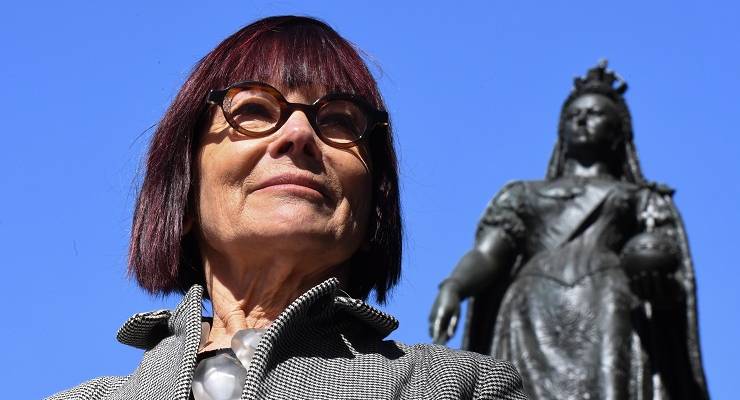
Historian and Gough Whitlam biographer Jenny Hocking first applied to access the Palace Letters — sent between former governor-general Sir John Kerr and Buckingham Palace around the time of the Dismissal — in 2011. What ensued was a long campaign and legal fight. In this extract from her new book, she reflects on losing her appeal to the Full Federal Court last year, and taking the next step.
“If ever a case cried out for appeal to the High Court, it’s this one!” Bret Walker had said on reading the Full Federal Court’s judgment.
Tom Brennan was still chuckling at the recollection when we met in his chambers with solicitors from Corrs Chambers Westgarth soon after the Federal Court’s decision. We were there to discuss the prospects for an appeal to the High Court of Australia, and I was not at all convinced that any of them would want to continue.
The Full Federal Court majority decision seemed definitive — it was spearheaded by the chief justice, and both of those justices were expert in this field of administrative law, so it would be difficult to overturn. If the legal team felt there was no reasonable avenue for further appeal to the High Court of Australia, the case would end right there.
The most striking thing about an appeal to the High Court is the staggeringly low success rate — before you even walk in the door. It begins with an application for special leave to appeal: just 10% of those will succeed and go forward as an appeal to the High Court itself. Of those who apply for leave to appeal, around 40% are called to a hearing before two or three of the High Court justices, and only 25% of those heard are then granted leave to appeal.
If our application was among the 40% to be granted a special-leave hearing, each side would have 20 minutes to present its case for and against leave to appeal, with Bret Walker SC as my lead barrister given ten minutes additional time in reply. The justices would decide there and then whether leave was granted.
It sounded mercifully quick and clean. As to our prospects, Tom felt there was a strong chance that leave to appeal would be granted; the appeal itself, however, was more difficult to assess.
The case addressed significant matters of public interest about the interpretation and operation of the Archives Act that are fundamental to the workings of government, as well as access issues central to the transparency and accountability of those in public office. The Full Court’s interpretation of the Archives Act as carving out the records of the governor-general, when the text did not exclude them, provided further grounds.
The legal view was clear: there were strong grounds for appeal and, if I decided to go ahead with the appeal, they would all continue to work on the case on a pro bono basis. The apparent “convention of royal secrecy” had shielded the activities of the monarch and the monarchy across the Commonwealth nations for decades. It was impenetrable, and almost impossible to overcome. Few cases offered the possibility that we were now on the cusp of achieving — to challenge the Queen’s embargo over royal correspondence in Australia’s highest court.
If there was any way I could continue, I would. I had 30 days from the Full Court’s decision to make a decision on whether to appeal. I held to the line I had taken previously — if the legal advice was solid and the legal team was willing to continue on a pro bono basis, I would work through the risks, and the case would continue.
Besides, Justice Flick’s incisive, excoriating dissent had presented such clear points for appeal that it seemed almost impolite to refuse. On March 8, 2019, I filed an application for special leave to appeal to the High Court of Australia.
This is an edited extract from The Palace Letters: The Queen, the governor-general, and the plot to dismiss Gough Whitlam by Jenny Hocking (Scribe, $32.99), out now.







Damn! Now I’ll have to buy the bloody book to find out what happened
Bravo for your honorable persistence Jenny. I’m guessing that you’re an inner-city elite. You’ve done some heavy lifting in expanding Australia’s independence. We’ll doubtless have lickspittles like Kerr again but he/she won’t have the weight of the crown for support. One day we might become a republic.
Very good Wayne, the inner-city elite comment. See my belated comment on the previous article.
Great work Jenny Hocking. Damned liberals.
A huge thank you and hearty congratulations to you and your magnificent pro bono team.
The revelations about the subversive role of QE2 and her lackeys were astounding, the truth had to come out.
Marvellous effort Jenny.
Sad that only 3 commenters deemed this matter worthy of comment.
After all, it only concerns how we are (mis)governed – why would that interet anyone?
Just takes me awhile to get around to Crikey, Dounreay. I’ve found about 2 to 3 days old is the sweet spot, I get to enjoy a lot of the comments that way, except for one.
The admirable work by Jenny Hocking, and their legal team, highlights the utterly insane admiration many in our governing teams hold for the present day USA. They are not, and never were our friends. We are a business opportunity, and their military interventions around us, are to either protect, or expand their economic interests. The CIA proven involvement in running Kerr as an asset, Whitlam’s political assassination for daring to push back on Pine Gap, Khemlani, the ASIO involvement in the downfall of Chile’s Allende, which they traitorisly continued, with CIA guidance, after Whitlam ordered it discontinued, and so much more. Now our independence from the US decades of war mongering nonsense, is dealt a fatal blow by Morrison’s band, with the subs, the flawed F35 fighters, Dutton’s tanks, and US troop build-ups and the rest.